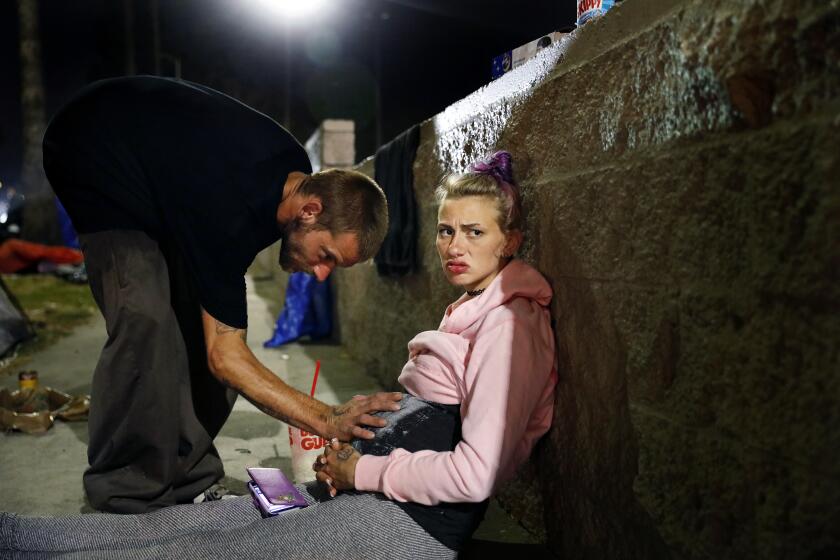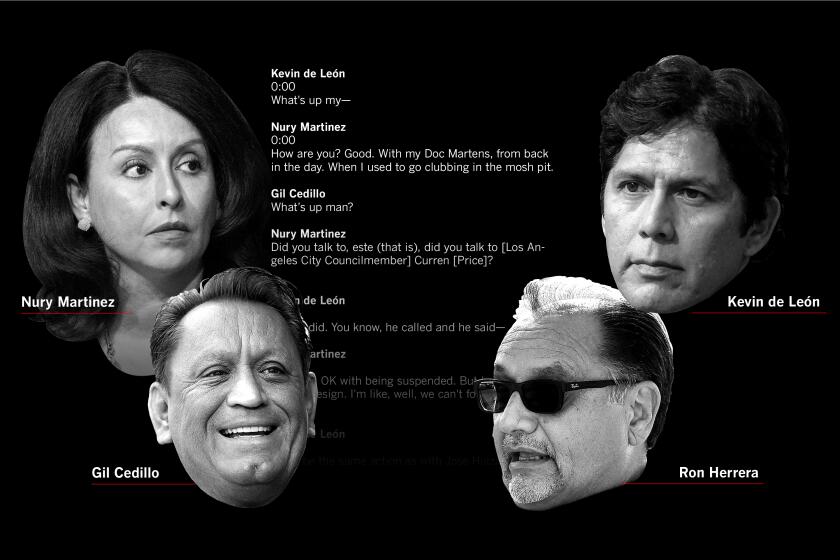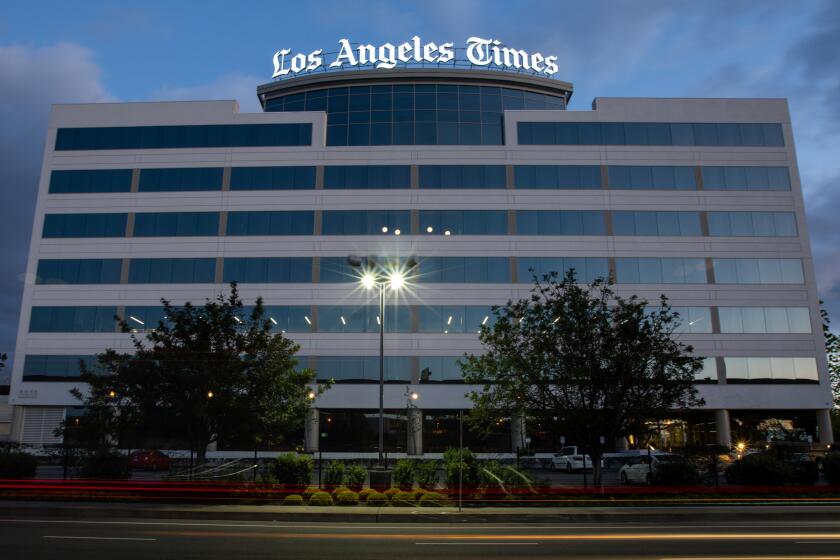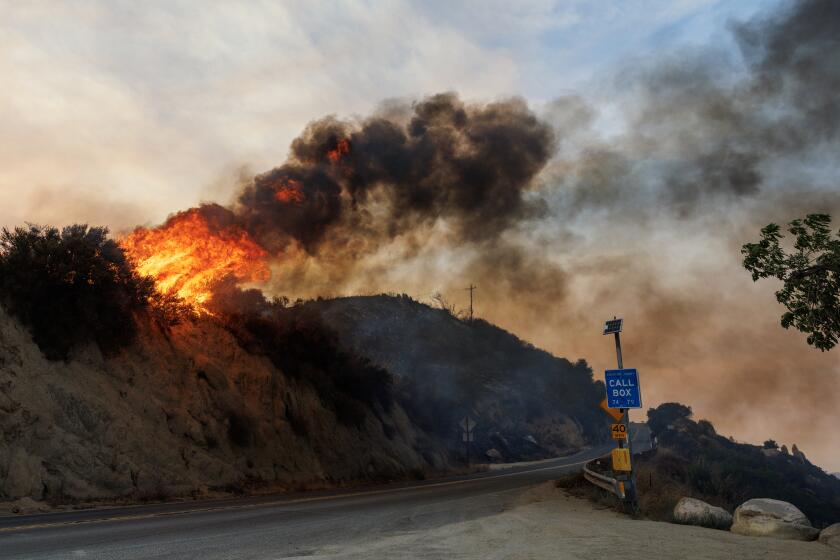Los Angeles Times wins Pulitzer Prizes for covering homelessness and City Council leak
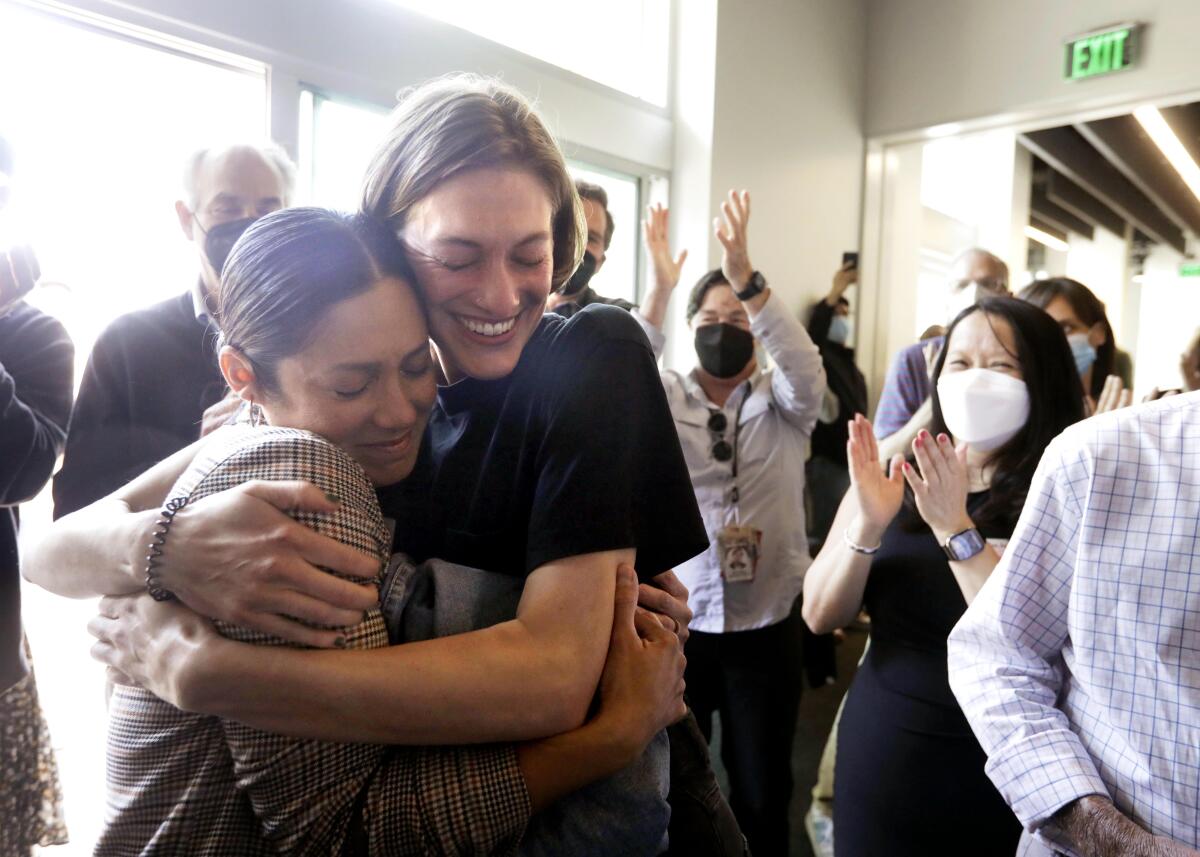
The Los Angeles Times won two Pulitzer Prizes on Monday for coverage of two of the most troubling problems facing Southern California: homelessness and racial division.
The newspaper’s staff won the Pulitzer for breaking news for a series of stories on a secret audio recording that exposed Los Angeles City Council members scheming in a crass and racist bull session about political power in the city.
Audio of Councilmembers Nury Martinez, Kevin de León and Gil Cedillo speaking with labor leader Ron Herrera quickly became a new and incendiary issue in the Nov. 8 election.
Christina House won the feature photography prize for her deeply empathetic images of a young woman living alongside the Hollywood Freeway while coping with drug issues and the birth of a child.
In an encampment above the Hollywood Freeway, nothing about Mckenzie Trahan’s future is certain.
The Times has now won seven breaking news Pulitzers, more than any other news organization. This also marked the fifth year in a row that the newspaper won at least one Pulitzer, considered the top honor in journalism, and brings The Times’ all-time Pulitzer total to 51.
The paper’s staff was a finalist in the local reporting category for its series of stories on the wave of illegal cultivation, corruption and worker exploitation that followed the legalization of marijuana in California.
California’s legalization of recreational cannabis in 2016 ushered in a multibillion-dollar industry. But many of the promises of legalization have proved elusive.
The Pulitzer board, based at Columbia University in New York, awarded the Public Service Medal to the Associated Press for “courageous reporting from the besieged city of Mariupol that bore witness to the slaughter of civilians in Russia’s invasion of Ukraine.” The news service also won for breaking news photography for images from the war-ravaged city.
The website AL.com rivaled much larger outlets by earning two Pulitzers. A four-reporter team at the Alabama news site exposed how a town police force preyed on residents to inflate revenue; forcing out the police chief and prompting four new laws. AL.com also won in commentary for Kyle Whitmire’s “measured and persuasive columns” on how the state’s Confederate heritage still colors the present with racism and exclusion.
More than 100 members of the Los Angeles Times’ staff gathered at noon in the lobby of the paper’s offices in El Segundo to hear the news and to celebrate with champagne and a taco lunch.
“You don’t win big prizes if you’re not doing the work consistently every day,” said Times Executive Editor Kevin Merida. “I think the whole newsroom gets credit. So wrap yourself in the hug, because it takes all of us to produce this work.”
Merida added that the prizes “reflect careful, sophisticated, nuanced reporting and photography on complex topics important to Angelenos: power, representation, race relations, homelessness.”
Times owner Patrick Soon-Shiong and his wife, Michele, also attended the celebration.
“It’s especially meaningful that coverage of homelessness and local government have won Pulitzers this year,” Soon-Shiong said. “We’re committed to independent journalism that serves as a voice for those who are marginalized and underserved, and will continue to speak truth to power.”
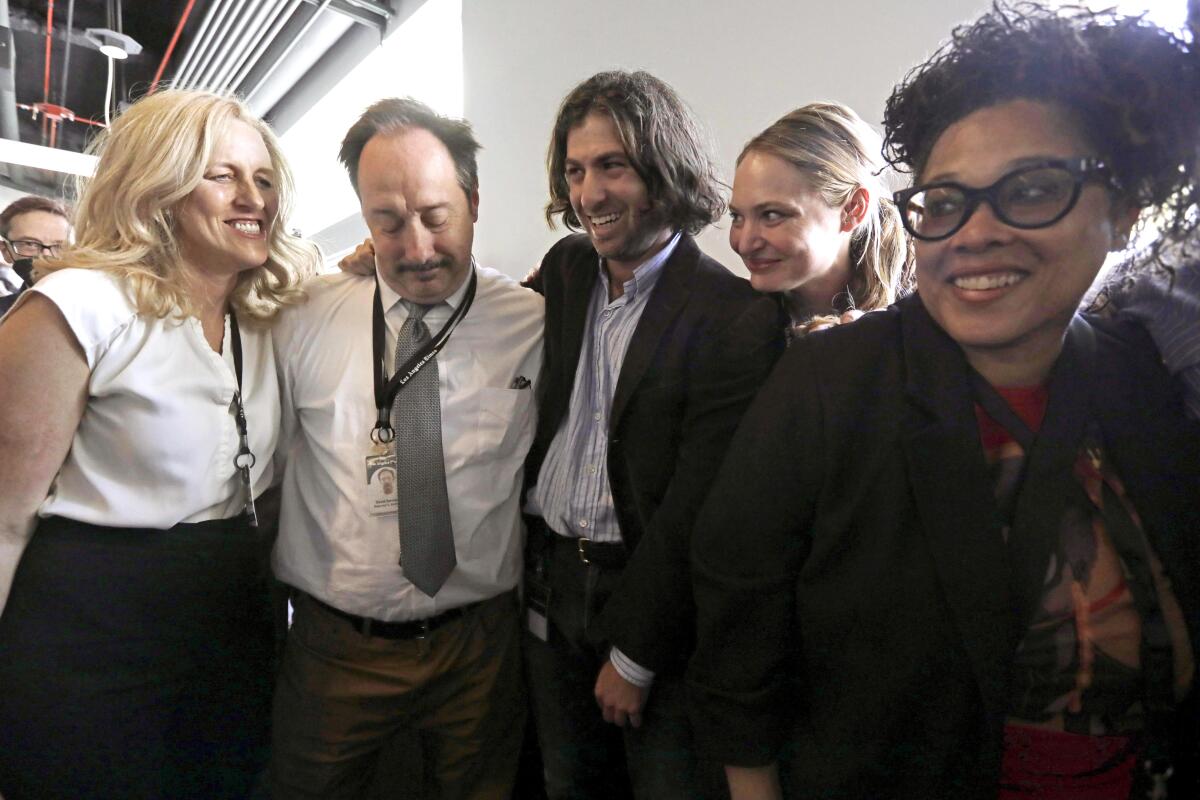
A story that would come to dominate L.A. and its leaders for months began on a Saturday afternoon in early October, when reporter Julia Wick received a tip from a source: Members of the L.A. City Council and a labor leader had been recorded as they held a raw and ugly private chat about how they could hold on to power in the city.
A posting about the recording had appeared weeks earlier on Reddit. A full version was later uploaded to a Reddit user’s profile page but received little attention before The Times obtained a copy of the audio and began the intense and painstaking work of verifying and analyzing the contents, a task headed by Wick, David Zahniser, Dakota Smith and Benjamin Oreskes.
Just after 9 a.m. on Sunday, Oct. 9, The Times posted a story detailing how Los Angeles City Council President Nury Martinez made cruel and racist remarks as she and fellow city lawmakers Kevin de León and Gilbert Cedillo discussed how they and other Latino politicians would solidify their positions.
Martinez focused particular animus on then-Councilman Mike Bonin, who is white, and Bonin’s young son, who is Black. At one point, Martinez called Bonin a “little bitch” and referred to his son as a “changuito,” or “like a monkey.” She also said Bonin’s son had misbehaved on a parade float and needed a “beatdown.”
While the reporters worked to validate the recordings, Times General Counsel Jeff Glasser fended off legal threats by lawyers from the Los Angeles County Federation of Labor, whose president, Ron Herrera, had joined in the talk about increasing the number of seats on the City Council held by Latinos. The union argued the recording had been obtained illegally, without the permission of the participants, leaving The Times open to “potential liability.” Glasser countered that the paper had a 1st Amendment right to publish information of intense public interest.
The revelations triggered a wave of indignation and calls for Martinez and the other council members to resign. In less than a week, the powerful council president was pressured into resigning. Cedillo had lost his reelection bid months earlier and left the council at the end of his term, while demands for De León’s resignation continue to this day.
Herrera also resigned, ending his tenure at “the Fed,” one of the most powerful labor and political organizations in California.
Over the weeks that followed, much of The Times’ staff would become engaged in parsing the recording and its contexts, including over redistricting, obscure political rivalries and the sweeping racial divisions that beset Los Angeles.
One story dived into the fragile and newly threatened alliances between Black and Latino Angelenos. Another profiled the blunt-talking Martinez, known for her representation of working-class San Fernando Valley communities such as Arleta, Sun Valley and Panorama City.
The Times later published an annotated comprehensive transcript of the entire dialogue to help readers decode its jargon and arcane references. Times journalists explained references to other city corruption cases, where “bags of cash” were passed, and broke down the councilwoman’s proud reference to wearing her “Doc Martens” — effectively telling her colleagues that she came to their meeting “to rumble.”
A bombshell recording has thrown L.A. politics into chaos. What was really being discussed? L.A. Times reporters and columnists pick it apart, line by line.
More than a dozen Times journalists shared bylines or credit lines on the stories submitted to the Pulitzer judges. They included City Hall regulars Zahniser, Smith and Wick, along with Oreskes and others quickly drawn into the story: Gustavo Arellano, Erika D. Smith, Jessica Garrison, Ruben Vives, Marisa Gerber, Angel Jennings, Emily Alpert Reyes, Melanie Mason and Libor Jany.
Assistant Managing Editor Steve Clow, a newsroom veteran who has headed other Pulitzer-winning efforts, spearheaded the coverage.
Zahniser, who has covered Los Angeles City Hall for more than two decades, said he was surprised that the breaking news Pulitzer had gone to a story that began as a City Hall intrigue, because the award often goes to accounts of death and destruction, both natural and man-made.
The revelations hit Angelenos so hard because “it struck at the heart of whether they could believe in their city, whether they could believe in their government. And I think L.A., on really good days, has this aspirational thing about how everybody can live together harmoniously,” Zahniser said. But the “casual cruelty and reflexive racism” unveiled by the recording “took a baseball bat” to the notion of a post-racial L.A.
House’s work grew out of her collaboration with video journalist Claire Collins and homelessness reporter Gale Holland. Collins had the initial idea to focus intently on the travails of unhoused women who endure pregnancies, and sometimes births, while living on the street.
The story began when Holland got a call from a mother, Cat Trahan, distraught that her daughter had lost all of her possessions, including her prenatal vitamins, during a sweep of her encampment. Afraid the younger Trahan would disappear, House insisted: “We need to go now.” Collins, Holland and House soon found themselves stepping through a hole in the fence above the freeway and into the world of Mckenzie Trahan, nearly seven months pregnant and a member of Hollywood’s unhoused community since she was 13.
Over the following years, they came to deeply know not only Trahan but two other women — her mother and case manager — whose lives were also blighted by homelessness.
House captured the most intimate moments of the young woman’s life, including as she gave birth to her daughter and later as she shared a bath with her baby.
Since 1942, The Times has won 52 Pulitzer Prizes, six of which were gold medals for public service.
Speaking to colleagues Monday, House described how she was once inspired by a T-shirt worn by Lakers great Kareem Abdul Jabbar. Its message: Make a friend with someone who is different from you, and your world will change.
“That’s the reason we do what we do,” House said. “We invite readers to . . . view the world from a different perspective. I think that is why this story hit home, because Mckenzie is a homeless person living on the streets, struggling with a multitude of issues. But first and foremost, she is a human being.”
The stories appeared in a special section of The Times last July, headlined “Hollywood’s Finest.”
A documentary Collins made as part of the project premiered at the Big Sky Documentary Film Festival and was named a finalist for feature in January 2023.
The Times’ series on legalized marijuana that was named a Pulitzer finalist revealed widespread criminality, labor abuses and environmental consequences for California. To get the stories, a team of reporters filed myriad public records requests and conducted sometimes dangerous forays into the field.
The investigation provoked the California Department of Cannabis Control into expanding its mission to investigate labor exploitation and human trafficking. The stories got the state’s workplace safety agency to launch an investigation into farmworker deaths that had been cited by The Times. Lawmakers also pledged to introduce new protections for cannabis workers.
Besides the 15 prizes for journalism, eight prizes were given for the arts and literature, including a first in the more-than-100-year history of the honors — a double award in the fiction category, with Barbara Kingsolver winning for “Demon Copperhead and Hernan Diaz honored for “Trust.”
More to Read
Sign up for Essential California
The most important California stories and recommendations in your inbox every morning.
You may occasionally receive promotional content from the Los Angeles Times.

